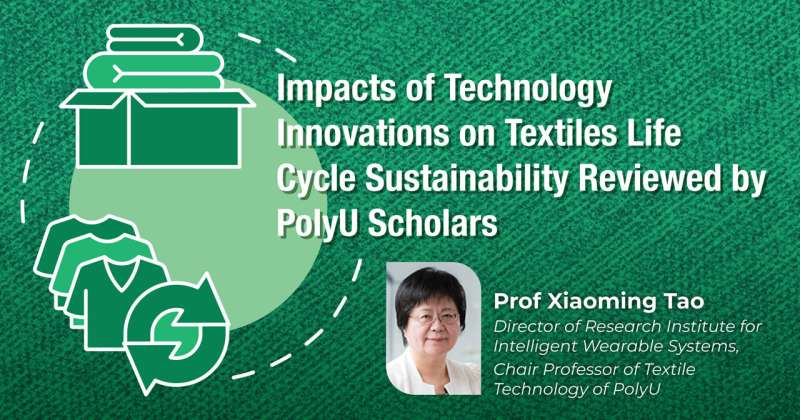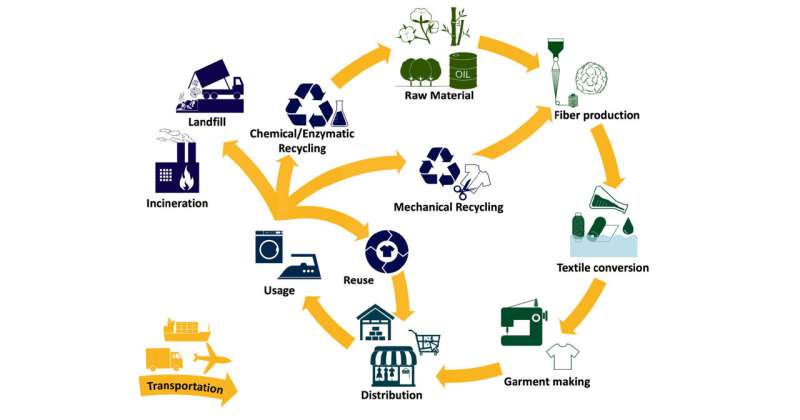This article has been reviewed according to Science X's editorial process and policies. Editors have highlighted the following attributes while ensuring the content's credibility:
fact-checked
peer-reviewed publication
trusted source
proofread
Study reviews technology innovations for advancing sustainability of textiles

The life cycle of textile products spanning from raw materials to fiber production, textile conversion, distribution and disposal contributes to 5%–10% of global greenhouse gas emissions. In addition, textile industry accounts for the second largest consumption of the world's water supply, and it greatly pollutes waterways with microplastics and colorants.
With this significant implication on environment and human, the Hong Kong Polytechnic University (PolyU) has unveiled a research study to review technology innovations for advancing sustainability of textiles.
Prof. Xiaoming Tao, director of the Research Institute for Intelligent Wearable Systems and Chair Professor of Textile Technology of PolyU and Dr. Svetlana Boriskina of Massachusetts Institute of Technology have teamed up to study technological innovations to reinforce and accelerate green transformation of textiles. The study entitled "Advancing life cycles sustainability of textiles through technological innovations" was published in Nature Sustainability. The research highlighted a systematic analytical framework, which identifies and elucidates impactful textile technology developments.
The research team analyzed impacts of green technologies for textiles based on the 17 Sustainable Development Goals outlined by the United Nations Agenda 2030, particularly those concerning the deployment of natural resources, energy and environmental impacts. The study collected 22,724 publications during the past ten years, in which 940 were screened and 215 were studied in details.

In the study findings, sustainability through innovations in raw and fiber materials, manufacturing technologies and textile recycling are discussed as future research and development direction for the industry. These technological developments could also accelerate green transformation of textiles to achieve sustainability.
The study covers topics in:
- green sciences and process based on high-throughput
- data-driven discovery studies to identify and develop sustainable replacement for synthetic polyester and nylon fibers
- biomass-based and degradable fiber-forming materials
- biological science on cultivation of insect- and disease-resistant plant seeds that require less water
- waterless and less-water coloration
- reduction or elimination of production steps
- mono-materially in textiles for proactive material recovery
Prof. Tao said, "The research team spent two years to critically study major technology developments in both industry and laboratories, and their impacts on sustainability in a cradle-to-grave fashion. The team examined the state-of-the-art technology developments meant to solve sustainability issues throughout the complete life cycle of textiles. This study paves the way for an open, systematic and qualitative large-scale data analysis for sustainability research."
Looking ahead, promotion of green science and technology is crucial to solve sustainability issues from the root to end of textiles life cycle. For instance, large scaled applications of green fibers made from bio-sources will eliminate the poor degradability and microfiber contamination from petroleum derived synthetic fibers. Also, technology developments will significantly reduce energy and water use in textile conversion and consumption processes. Recycling, especially mechanical recycling, will become a major technology for single-material or some blend textiles. Despite of challenges in adaptation, mono-material textiles will be possibly one of the most effective design strategies for proactive material recovery and recycling efficiency.
More information: Lisha Zhang et al, Advancing life cycle sustainability of textiles through technological innovations, Nature Sustainability (2022). DOI: 10.1038/s41893-022-01004-5


















